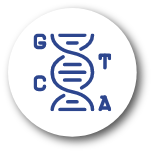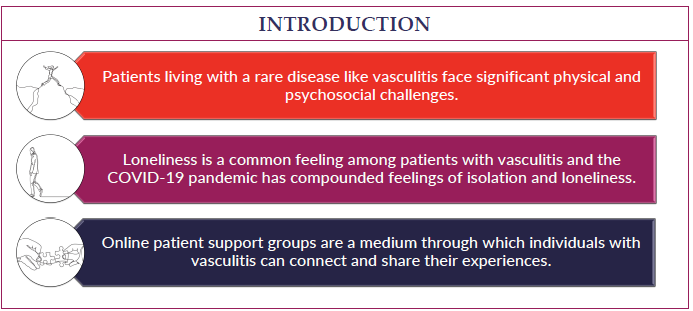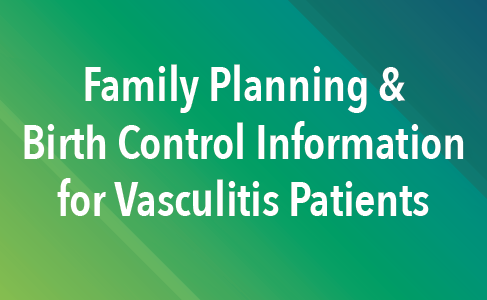Vasculitis Types
About Eosinophilic Granulomatosis with Polyangiitis
Last Updated on February 5, 2022
Eosinophilic granulomatosis with polyangiitis (EGPA), formerly called Churg-Strauss syndrome, is a form of vasculitis—a family of rare diseases characterized by inflammation of the blood vessels, which can restrict blood flow and damage vital organs and tissues. EGPA is one of the rarest forms of vasculitis and primarily affects the small blood vessels. Individuals diagnosed with EGPA usually have a history of asthma or allergies.

Quick Facts

11-14 Cases per Million Worldwide

Number of US cases unknown

Average age is 35-50, but can occur at any age

Rare in children

Equally split between males and females

Ethnic prevalence unknown
Eosinophilic granulomatosis with polyangiitis (EGPA) is a form of vasculitis that affects the small blood vessels. EGPA can affect the lungs, sinuses, skin, heart, intestinal tract, kidneys, nerves, and other organs. Formerly called Churg Strauss syndrome, EGPA is one of the rarest forms of vasculitis.
Vasculitis is a group of rare disorders that are associated with inflammation of the blood vessels. Inflammation of blood vessels may result in narrowing of the vessel, which can block or slow down blood flow to vital organs and tissues. Vasculitis is classified as an autoimmune disorder—a disease that occurs when the body’s natural defense system mistakenly attacks healthy tissues.
EGPA is known as an ANCA-associated vasculitis, referring to a blood protein (anti-neutrophil cytoplasmic antibody) that attacks the body’s own cells and tissues. Other forms of ANCA-associated vasculitis include granulomatosis with polyangiitis (GPA) and microscopic polyangiitis (MPA). The detection of ANCA in the blood can support a diagnosis of EGPA in some patients.
The cause of EGPA is not fully understood. Researchers believe an infection may set the inflammatory process in motion. Environmental factors such as inhaled allergens, or certain medications or vaccinations, may also play a role in starting EGPA or in its return. Family history and genetics may also cause it.
EGPA can occur at any age; however, the average age of diagnosis is between 35 and 50 years old. Women and men appear to be affected equally. EGPA is considered extremely rare.
The symptoms of EGPA can range from mild to life threatening, depending on which organs are involved and the extent of disease. Symptoms may vary among individuals. Almost all patients have asthma and/or sinus or nasal polyps, and a higher-than-normal level of white blood cells, which are called “eosinophils.”
Symptoms include:
- Fever
- Fatigue/malaise
- Rapid and sudden weight loss
- Muscle and joint pain
- Skin rashes
- Numbness or tingling of the hands or feet
- Sudden loss of strength in the hands or feet
- Chest pain or palpitations
- Increasing shortness of breath or coughing
- Abdominal pain
- Presence of blood in the stools
There is no single test for diagnosing EGPA, so your doctor will consider a number of factors, including a detailed medical history and physical examination, as well as:
- Urinalysis: Excessive protein or presence of red blood cells may indicate inflammation of the kidneys. Your doctor may use this test to help diagnose EGPA, and to monitor the kidneys during and after treatment.
- Blood tests: The ANCA test, when positive, can be helpful in confirming diagnosis; however, it is positive in only 30-50 percent of individuals with EGPA. Also, it can be positive in other diseases. Other common tests include the erythrocyte sedimentation rate test, or “sed rate,” and the C-reactive protein test. All of these tests may support a diagnosis of EGPA but are not conclusive on their own. A tissue biopsy is typically needed.
- Tissue biopsy: This surgical procedure removes a small tissue sample from an affected vessel or organ, which is examined under a microscope for signs of inflammation or tissue damage.
- Imaging studies: X-rays and computed tomography scans may reveal changes in your lungs or sinuses that are characteristic of EGPA, such as nasal and sinus polyps.
- Heart echocardiogram: This is an ultrasound of the heart. All patients with EGPA should be screened for heart involvement at the time of the diagnosis.
Non-severe EGPA is traditionally treated with steroids, such as prednisone, in combination with drugs that suppress the immune system’s response, such as mepolizumab, methotrexate, azathioprine, or mycophenolate mofetil. Severe disease is treated with steroids in combination with cyclophosphamide, a cytotoxic agent, or rituximab, a biologic agent. Treatment choices are based on manifestations and severity of disease. Mepolizumab is a biologic agent that has been approved for non-severe EGPA in combination with prednisone. Biologic
medications are complex proteins derived from living organisms. They target certain parts of the immune system to control inflammation. In EGPA, mepolizumab works by reducing the number of eosinophils in the body. When present in normal levels, eosinophils can help protect the body against infections, but overproduction can cause inflammation and potentially damage vital organs and tissues. Mepolizumab is indicated for patients with mild to moderate disease with mainly asthma, sinus, nose, and ear symptoms. It is not indicated for more severe disease.
Learn More About Treatments for Vasculitis
In 2021 the American College of Rheumatology (ACR) published guidelines for the management of certain vasculitides, that were also endorsed by the Vasculitis Foundation (VF). Clinical practice guidelines are developed to reduce inappropriate care, minimize geographic variations in practice patterns, and enable effective use of health care resources. Guidelines and recommendations developed and/or endorsed by the ACR are intended to provide guidance for particular patterns of practice and not to dictate the care of a particular patient. The application of these guidelines should be made by the physician in light of each patient’s individual circumstances. Guidelines and recommendations are subject to periodic revision as warranted by the evolution of medical knowledge, technology, and practice.
The medications used to treat EGPA have potentially serious side effects, such as:
- Lowering your body’s ability to fight infection
- Potential bone loss (osteoporosis), among others
Therefore, it is important to see your doctor for regular checkups. Medications may be prescribed to offset side effects. Infection prevention is also very important. Talk to your doctor about getting a flu shot, pneumonia vaccination, and/or shingles vaccination, which can reduce your risk of infection.
Even with effective treatment, relapses are common for individuals with EGPA. If your initial symptoms return or you develop new ones, report them to your doctor as soon as possible. Regular doctor visits and ongoing monitoring of lab and imaging tests are important in detecting relapses early.
Among the most serious potential complications are heart problems, treatment-induced infections, persistent asthma and, for some, long-lasting numbness or decreased sensitivity in feet or hands. Long-term follow-up is important.
Effective treatment of EGPA may require the coordinated efforts and ongoing care of a team of medical providers and specialists. In addition to a primary care provider, you may need to see the following specialists:
- Rheumatologist (joints, muscles, and immune system)
- Pulmonologist (lungs)
- Cardiologist (heart)
- Nephrologist (kidneys)
- Dermatologist (skin)
- Neurologist (brain/nervous system); or others as needed
The best way to manage your disease is to actively partner with your health care providers and get to know the members of your health care team. It may be helpful to keep a health care journal to track medications, symptoms, test results and notes from doctor appointments in one place. To get the most out of your doctor visits, make a list of questions beforehand and bring along a supportive friend or family member to provide a second set of ears and take notes.
Remember, it’s up to you to be your own advocate. If you have concerns with your treatment plan, speak up. Your doctor may be able to adjust your dosage or offer different treatment options. It is always your right to seek a second opinion.
Living with a chronic condition such as EGPA can be overwhelming at times. Fatigue, pain, emotional stress, and medication side effects can take a toll on your sense of well-being. It can affect your relationships, work, and other aspects of your daily life. Sharing your experience with family and friends, connecting with others through a support group, or talking with a mental health professional can help
There is no cure for EGPA at this time, but with early diagnosis and proper treatment, many patients can lead full, productive lives. The majority of EGPA patients respond well to treatment. Because relapses are common with EGPA, follow-up medical care is essential.
Learn more about ANCA-Associated Vasculitis (AAV) https://www.anca101.com/
EGPA Videos
ACRVF Guidelines Conference: EGPA Breakout
Research Insights: Improving Diagnostics and Treatment of Small-Vessel Vasculitis
Research Insights: Precision Medicine in the Treatment of ANCA-associated Vasculitis
Patient Heroes: Kate Tierney































































